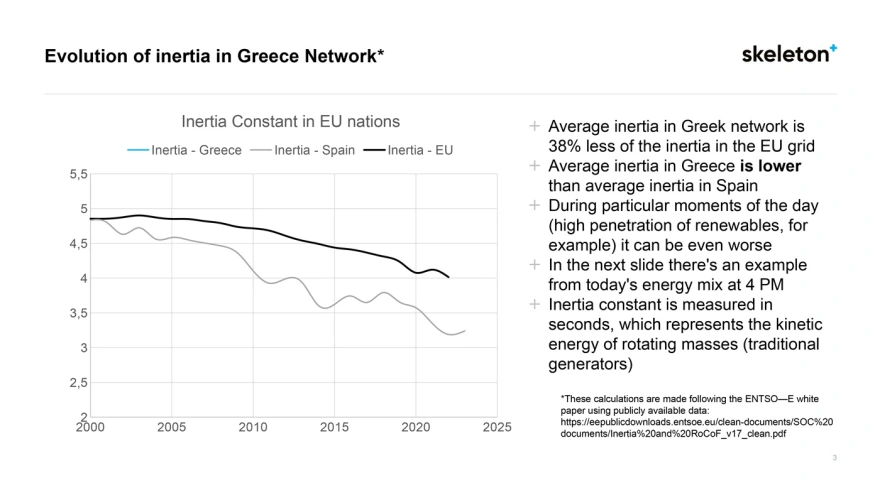In late April, a significant power outage affected the Iberian Peninsula, leaving Spain and Portugal in darkness for several hours. This unusual incident sparked concerns throughout Europe regarding the stability and resilience of national power grids, especially as many countries hasten their shift to renewable energy. Although Spain has since restored its systems, experts caution that similar events could arise in other countries, including Greece, potentially posing even greater risks.
The Spanish Blackout: A Technical Breakdown
The blackout in Spain wasn’t the result of a natural disaster or a singular catastrophic event; rather, it stemmed from a complex technical failure. Analysts and data from companies like Skeleton indicate that the incident resulted from a sudden voltage drop, known as a loss of inertia, in the grid. This loss occurs when the system cannot maintain stable frequency and voltage, particularly during peak demand or sudden supply fluctuations.
Specifically, the situation involved a rapid five-second disruption, leading the entire grid to collapse to protect infrastructure from more extensive damage. Contributing factors included the aging network infrastructure and its inability to accommodate the growing integration of renewable energy sources, which, while essential for a sustainable future, present new challenges for grid stability.

Are European Power Grids Prepared?
Experts have long been warning that many European countries’ power grids are nearing critical thresholds. Even Germany, which leads in renewable energy integration, has not sufficiently invested in modernizing its electrical infrastructure over recent decades. The absence of a modern and resilient framework increases the risk of cascading failures, especially as the energy landscape evolves.
The recent event in Spain demonstrates the fragility of these systems and highlights the urgent need to upgrade grid infrastructure to handle variable renewable energy and the complexities of cross-border energy flows.

The Risks Facing Greece
According to Taavi Madiberk, President and CEO of Skeleton, Greece is at an even greater risk than Spain was before its blackout. Data reveals that Greece’s grid is particularly susceptible, marked by low voltage stability and insufficient recent modernization investments. Despite being a significant renewable energy producer within the Eurozone, Greece’s infrastructure is reportedly ill-equipped to handle the demands of a modern, renewable-heavy grid.
Madiberk warns that Greece’s grid stability is among the lowest in Europe, making it more prone to unexpected failures. The combination of aging infrastructure, high levels of renewable energy integration, and limited investment creates a “perfect storm” that could lead to significant outages if not proactively addressed.
Preventive Measures and Future Solutions
Experts agree that significant investment and political commitment are crucial for solutions. Upgrading the power grid requires substantial capital, but the costs of inaction could be even higher—both economically and socially. Technologies such as advanced energy storage systems, upgraded transmission infrastructure, and smart grid management are essential for ensuring stability.
Skeleton provides innovative solutions, including high-capacity supercapacitors produced in Europe, aimed at preventing incidents similar to the Spanish blackout from recurring. However, these technical advancements must be supported by strong political will and strategic planning.

The Spanish blackout serves as a critical warning about the vulnerabilities present in aging and underfunded power grids. Greece, with its substantial renewable energy output yet aging infrastructure, faces an even greater danger. To safeguard its energy security, Greece must prioritize modernization, invest in resilient infrastructure, and adopt advanced technologies.
While the future of energy is undoubtedly renewable, ensuring grid stability and reliability is paramount. Without proactive measures, Greece risks experiencing a large-scale blackout that could be as or more disruptive than the recent incidents in Spain. Strategic planning today is essential for a secure and sustainable energy future.

Ask me anything
Explore related questions















